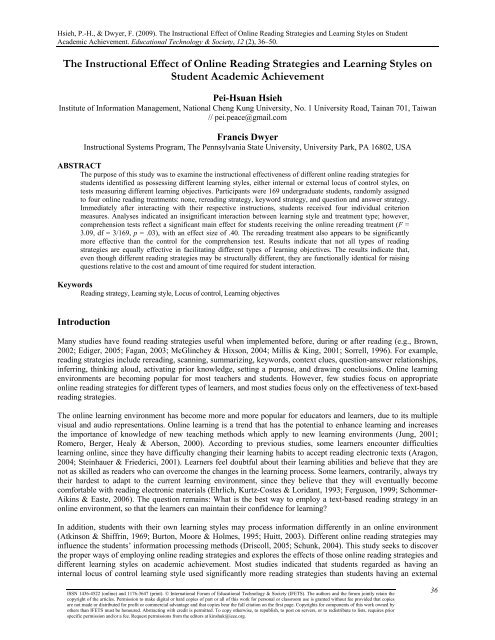Download - Educational Technology & Society
Download - Educational Technology & Society
Download - Educational Technology & Society
Create successful ePaper yourself
Turn your PDF publications into a flip-book with our unique Google optimized e-Paper software.
Hsieh, P.-H., & Dwyer, F. (2009). The Instructional Effect of Online Reading Strategies and Learning Styles on Student<br />
Academic Achievement. <strong>Educational</strong> <strong>Technology</strong> & <strong>Society</strong>, 12 (2), 36–50.<br />
The Instructional Effect of Online Reading Strategies and Learning Styles on<br />
Student Academic Achievement<br />
Pei-Hsuan Hsieh<br />
Institute of Information Management, National Cheng Kung University, No. 1 University Road, Tainan 701, Taiwan<br />
// pei.peace@gmail.com<br />
Francis Dwyer<br />
Instructional Systems Program, The Pennsylvania State University, University Park, PA 16802, USA<br />
ABSTRACT<br />
The purpose of this study was to examine the instructional effectiveness of different online reading strategies for<br />
students identified as possessing different learning styles, either internal or external locus of control styles, on<br />
tests measuring different learning objectives. Participants were 169 undergraduate students, randomly assigned<br />
to four online reading treatments: none, rereading strategy, keyword strategy, and question and answer strategy.<br />
Immediately after interacting with their respective instructions, students received four individual criterion<br />
measures. Analyses indicated an insignificant interaction between learning style and treatment type; however,<br />
comprehension tests reflect a significant main effect for students receiving the online rereading treatment (F =<br />
3.09, df = 3/169, p = .03), with an effect size of .40. The rereading treatment also appears to be significantly<br />
more effective than the control for the comprehension test. Results indicate that not all types of reading<br />
strategies are equally effective in facilitating different types of learning objectives. The results indicate that,<br />
even though different reading strategies may be structurally different, they are functionally identical for raising<br />
questions relative to the cost and amount of time required for student interaction.<br />
Keywords<br />
Reading strategy, Learning style, Locus of control, Learning objectives<br />
Introduction<br />
Many studies have found reading strategies useful when implemented before, during or after reading (e.g., Brown,<br />
2002; Ediger, 2005; Fagan, 2003; McGlinchey & Hixson, 2004; Millis & King, 2001; Sorrell, 1996). For example,<br />
reading strategies include rereading, scanning, summarizing, keywords, context clues, question-answer relationships,<br />
inferring, thinking aloud, activating prior knowledge, setting a purpose, and drawing conclusions. Online learning<br />
environments are becoming popular for most teachers and students. However, few studies focus on appropriate<br />
online reading strategies for different types of learners, and most studies focus only on the effectiveness of text-based<br />
reading strategies.<br />
The online learning environment has become more and more popular for educators and learners, due to its multiple<br />
visual and audio representations. Online learning is a trend that has the potential to enhance learning and increases<br />
the importance of knowledge of new teaching methods which apply to new learning environments (Jung, 2001;<br />
Romero, Berger, Healy & Aberson, 2000). According to previous studies, some learners encounter difficulties<br />
learning online, since they have difficulty changing their learning habits to accept reading electronic texts (Aragon,<br />
2004; Steinhauer & Friederici, 2001). Learners feel doubtful about their learning abilities and believe that they are<br />
not as skilled as readers who can overcome the changes in the learning process. Some learners, contrarily, always try<br />
their hardest to adapt to the current learning environment, since they believe that they will eventually become<br />
comfortable with reading electronic materials (Ehrlich, Kurtz-Costes & Loridant, 1993; Ferguson, 1999; Schommer-<br />
Aikins & Easte, 2006). The question remains: What is the best way to employ a text-based reading strategy in an<br />
online environment, so that the learners can maintain their confidence for learning?<br />
In addition, students with their own learning styles may process information differently in an online environment<br />
(Atkinson & Shiffrin, 1969; Burton, Moore & Holmes, 1995; Huitt, 2003). Different online reading strategies may<br />
influence the students’ information processing methods (Driscoll, 2005; Schunk, 2004). This study seeks to discover<br />
the proper ways of employing online reading strategies and explores the effects of those online reading strategies and<br />
different learning styles on academic achievement. Most studies indicated that students regarded as having an<br />
internal locus of control learning style used significantly more reading strategies than students having an external<br />
ISSN 1436-4522 (online) and 1176-3647 (print). © International Forum of <strong>Educational</strong> <strong>Technology</strong> & <strong>Society</strong> (IFETS). The authors and the forum jointly retain the<br />
copyright of the articles. Permission to make digital or hard copies of part or all of this work for personal or classroom use is granted without fee provided that copies<br />
are not made or distributed for profit or commercial advantage and that copies bear the full citation on the first page. Copyrights for components of this work owned by<br />
others than IFETS must be honoured. Abstracting with credit is permitted. To copy otherwise, to republish, to post on servers, or to redistribute to lists, requires prior<br />
specific permission and/or a fee. Request permissions from the editors at kinshuk@ieee.org.<br />
36
















